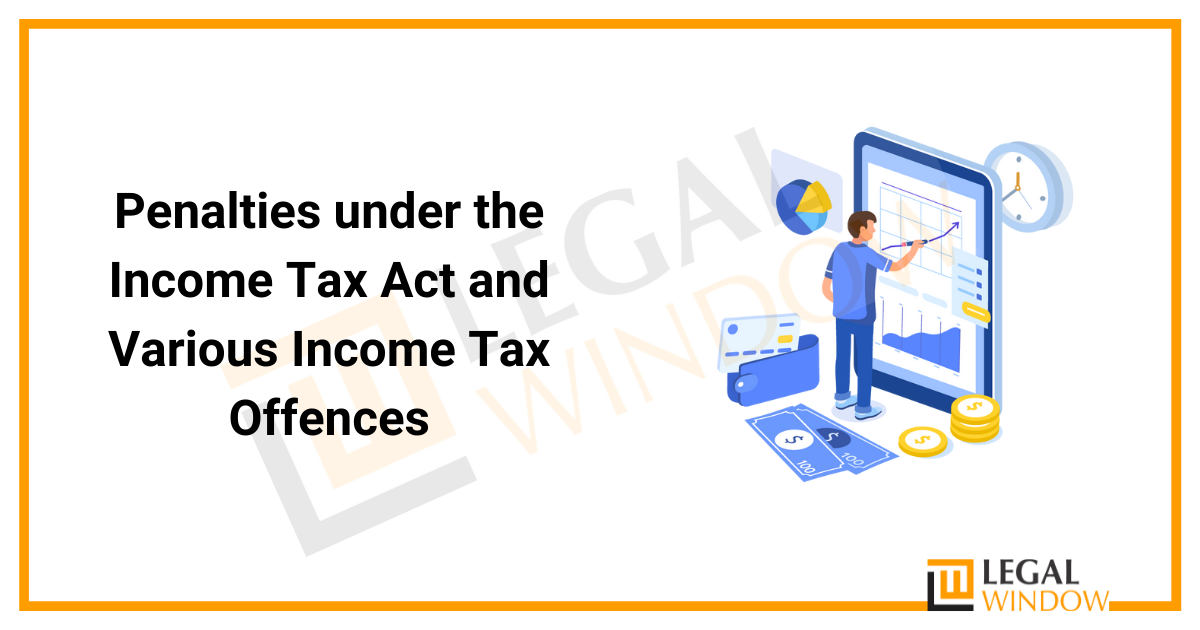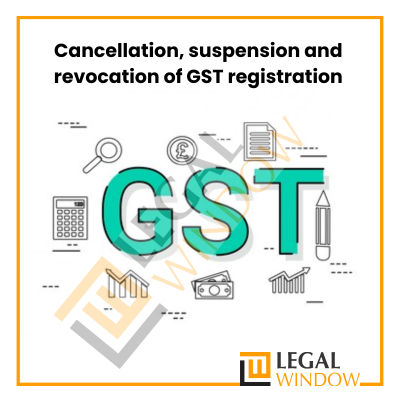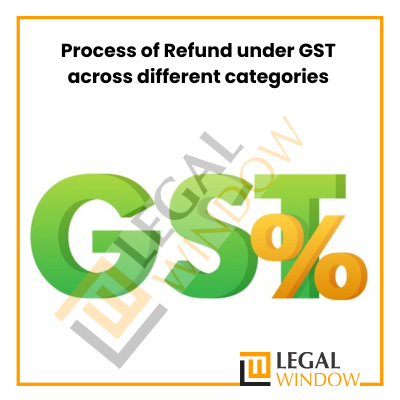Penalties under the Income Tax Act and Various Income Tax Offences
- March 2, 2022
- Income Tax

The timely and regular payment of taxes and submission of returns guarantees that the government has funds available for public welfare at all times. In addition, there are several penalties under the Act to ensure that taxpayers do not fail on paying taxes or giving information. Hence, a penalty is a type of punishment levied on a non-compliant taxpayer. Let us discuss Penalties under the Income Tax Act in brief.
| Table of Content: |
Income Tax in Penalties under the Income Tax Act
Income tax is a type of tax that you pay directly to the government based on your earnings or profits. Moreover, the Income Tax Department of India collects income tax. Further, these taxes are classified into two types: direct tax and indirect tax.
Direct tax is a tax that is applicable to earnings and income which you pay directly to the government. In contrast, indirect tax is a tax on products and services that is collected by someone else on your behalf and paid to the government, such as theatres, restaurants, and so on. Service tax, for example, is what you pay at a restaurant and is an indirect tax, whereas Income Tax, which government deducts from your income each month in the form of TDS, is an example of a direct tax.
Income Tax Act in Penalties under the Income Tax Act
In 1961, the Income Tax Act of India was enacted. Further, This Act covers the income tax laws as well as the different deductions that apply to it. However, the revision of the statute has taken place multiple times since 1961 to account for inflation and other socioeconomic factors.
The first Income Tax Act was enacted in India in 1860. Moreover, It was a suggestion by James Wilson as a way to compensate for the British government’s huge losses as a result of India’s independence movement in 1857. Further, the history of income tax in India as three distinct periods is as follows:
- The years 1860-1885
- Further, 1886-1914
- Moreover, from 1914 to the present
In India, the Income Tax Act, 1961 is now in effect. Moreover, the administration referred to the proposal to enforce the Income Tax Act in 1956. Further, in 1958, the Law Commission published its findings on the Income Tax Act, 1961. Moreover, in that same year, Chairman Shri Mahavir Tyagi presided over the Direct Taxes Administration Inquiry Commission.
Offences with their Penalties
The following are the punishments for the various offences under provisions of the Income Tax Act are:
| Sections | Offences | Penalties |
| 158BFA | Calculation of concealed income for the block period when a search is commenced under section 132 or for any books of account or any other document or any asset can be seized under section 132A in the case of any individual. | The minimum penalty in the preceding scenario will be 100 percent of the tax leviable on the unreported income, which can be enhanced to a maximum of 300 percent of the tax leviable on the undisclosed income. |
| 221(1) | If the assessee has undertaken some mistake on his or her tax payments. | The assessing officer will determine the amount of the punishment. However, the penalty cannot be greater than the arrears of payment. |
| 234E | An assessee failed to file the TDS/TCS return within the time frames stipulated in Sections 200(3) and 206C. (3). | The penalty under this provision shall be Rs 200 each day of noncompliance. |
| 234F | An assessee failed to file the return required by section 139(1) within the time period specified. | If the assessee files the return before December 31st of the relevant assessment year, the penalty is Rs 5,000. In all other cases, the fee will be Rs 10,000. However, if the assessee’s income is less than Rs 5 lakhs, the penalty should not exceed Rs 1,000. |
| 270A | In this provision, there might be two cases: if an assessee has under-reported his income, and if an assessee has under-reported for income misreporting. | In the first situation, the penalty will be 50% of the amount of tax owed on the unreported income. In the second situation, the penalty will be 200 percent of the amount of tax owed on the unreported income. |
| 271(1)(b) | If an assessee fails to file the return or respond to the notification, he would be punished under this clause. This section, however, only applies to the Assessment Year 2016-2017. | The penalty under this clause shall be Rs 10,000 for each failing. |
| 271(1)(c) | He concealed any details of his income or benefits, or he provided inexact details of his income or benefits. This section, however, only applies to the Assessment Year 2016-2017. | The minimum penalty under this clause is 100 percent of the evaded tax, and the maximum penalty is 300 percent of the avoided tax. |
| 271(1)(4) | Distribution of any money by a registered business that is not in accordance with the partnership agreement, and as a result, the partner returns income that is less than the true amount. This section, however, only applies to the Assessment Year 2016-2017. | The maximum penalty under this clause is 150 percent of the evaded tax. |
| 271A | Failure to retain, maintains, or hangs on to the records or books of accounts required under section 44AA. | This will result in an Rs 25,000 fine. |
| 271AA(2) | Failure to provide the authority with the information or documentation required under section 92D (4). | This will result in a Rs 5,00,000 fine. |
| 271AAA(1) | Where a search was begun under Section 132 between the 1st of June, 2007 and the 1st of July, 2012. | 10% of the stated prior year’s hidden income |
| 271AAA(2) | Nothing in subparagraph (1) shall apply. | if the assessee confesses the concealed income and specifies how it was derived, substantiates how the hidden income was derived, and pays the tax, plus interest, if any, on the undisclosed income There will be no penalty imposed under paragraph (c) of sub-section (1) of section 271. |
| 271AAB(1) | Where the search began between July 1st, 2012 and December 15th, 2016 | a) At a rate of 10% of the concealed income if: -Assessee admits the undisclosed income as well as the method of obtaining it.
-Provides evidence of how concealed income was obtained; -Pays the tax, plus interest, and files the return of income for the given preceding year, disclosing undisclosed income, on or before the stipulated date. b) At a rate of 20% of the hidden income if: -The assessee does not acknowledge the undisclosed income; -The assessee declares the income for the specified preceding year and pays the tax and interest on the undisclosed income on or before the specified date; and c) If not protected by clauses (a) or (b), –60% of the undeclared income from the preceding year. |
| 271AAB(1A) | Where the search began after December 15th, 2016 | a) At a rate of 30% of the concealed income if: – Assessee admits the undisclosed income as well as the method of obtaining it. -Provides evidence of how concealed income was obtained; -Pays the tax, plus interest, and files the return of income for the given preceding year, disclosing undisclosed income, on or before the stipulated date.
b) At a rate of 60% of the undeclared income if not protected by the requirements of article (a). |
Therefore, these are some of the offenses that find their place in the Income Tax Act, 1961.
Endnote
The most important source of revenue for the Indian government is probably income tax. Further, Government imposes this tax as an unavoidable burden on residents in order to collect revenue. Further, for the country’s growth and defense needs. Moreover, Income, purchase, and sale taxes, as well as property taxes, assist the government in running various government services and apparatus.
Hence, it is equally important for the tax-payer to fill out the Income Tax Returns or Taxes with honesty and on time to avoid any Penalties under the Income Tax Act later.
For more information about this topic kindly connect to our Experts.
CA Pulkit Goyal, is a fellow member of the Institute of Chartered Accountants of India (ICAI) having 10 years of experience in the profession of Chartered Accountancy and thorough understanding of the corporate as well as non-corporate entities taxation system. His core area of practice is foreign company taxation which has given him an edge in analytical thinking & executing assignments with a unique perspective. He has worked as a consultant with professionally managed corporates. He has experience of writing in different areas and keep at pace with the latest changes and analyze the different implications of various provisions of the act.
Categories
- Agreement Drafting (23)
- Annual Compliance (11)
- Change in Business (36)
- Company Law (147)
- Compliance (88)
- Digital Banking (3)
- Drug License (3)
- FEMA (17)
- Finance Company (42)
- Foreign Taxation (6)
- FSSAI License/Registration (14)
- GST (116)
- Hallmark Registration (1)
- Income Tax (199)
- Latest News (34)
- Miscellaneous (164)
- NBFC Registration (8)
- NGO (14)
- SEBI Registration (6)
- Section 8 Company (7)
- Start and manage a business (20)
- Startup/ Registration (126)
- Trademark Registration/IPR (40)
Recent Posts
About us
LegalWindow.in is a professional technology driven platform of multidisciplined experts like CA/CS/Lawyers spanning with an aim to provide concrete solution to individuals, start-ups and other business organisation by maximising their growth at an affordable cost.








